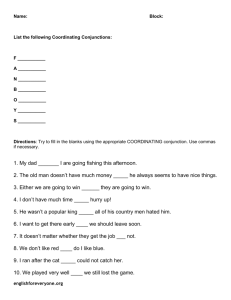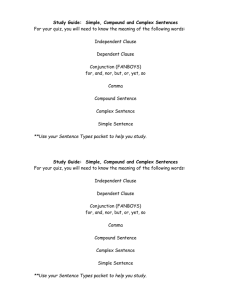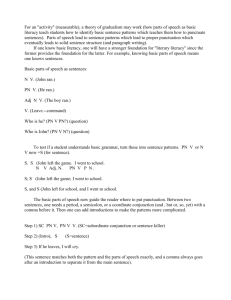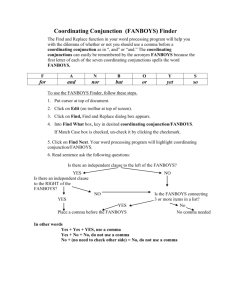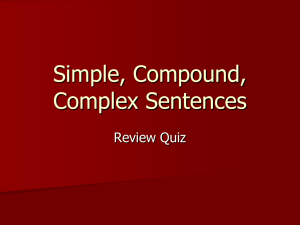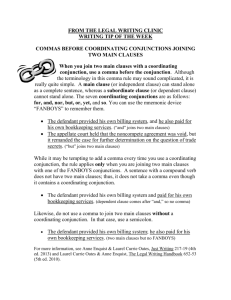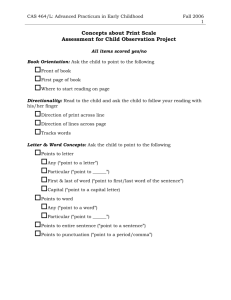Writing Sentences Gooder
advertisement
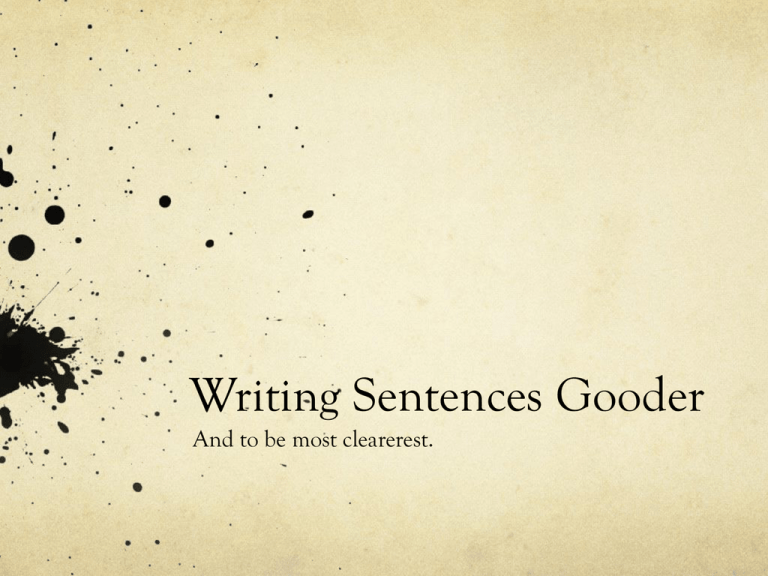
Writing Sentences Gooder And to be most clearerest. We all know these basic parts of speech NOUN: person, place, thing, idea. = Someone or something. VERB: action word. Tells what a subject does/did/will do. Sentences have similarities: A Noun Part and a Verb Part, and end punctuation. Numero Uno: the simple sentence Maybe you’ve seen these before. Noun Part + = Simple Sentence (then add punctuation (. ! ?). “John ran.” Or, “We left.” Verb Part Numero Dos: Maybe you’ve written these and not even recognized it. NP. VP. + NP. VP. Compound Sentence = For example, “I ran; I fell.” Or, “I ran, [coordinating conjunction] I fell.” Wait, a coordinating whassis? Coordinating conjunctions are linking words. They coordinate, or join together. They are easy, and they are most commonly seven, known by the acronym “FANBOYS.” You must use punctuation before a coordinating conjunction! F - for A - and N – nor Looking at it again then, a compound sentence with FANBOYS could read, “We ran, but they fell.” Or “We ran, so they fell.” Or “We ran, and they fell.” B - but O - or Y - yet S - so FANBOYS may look like K-Stew with teeth out. But I am not sure. So you’ve seen simple and compound sentences, what next? Another rule! Remember “FANBOYS?” Well there is one more step only: IF the independent clauses you are joining are less than 3 words long (e.g. “He ran, he fell.”) then you just need the coordinating conjunction (FANBOYS). So, “He ran and he fell.” Or “He ran so he fell.” Both are correct, actually. Sentence type three-o NP + VP + NP+ VP .?! = Complex Sentence. • The is a DEPENDENT CLAUSE, meaning it is not a complete phrase/sentence like the NP+VP above! • The dependent clause needs a connector, a SUBORDINATING conjunction, which has a different acronym than a coordinating conjunction. • Last, these sentences are used to “weight” the first/main clause most, so that it is the most important over the dependent clause. It’s a writing trick. Before the Example, You Get: A – After The Mighty AAAWWUBBIS! (consumer of tasty Guinea Pigs.) A – Although -There are more subordinating conjunctions, but these are the most A – As common, and you should try to remember them. W - When W – Whenever U – Unless WARNING, WARNING! Coordinating conjunctions (FANBOYS) always use a comma before them if the clause is over 3 words long. However, subordinating conjunctions B – Before (AAAWWUBBIS) do NOT use punctuation. Ever. B – Because I remember it like this: “If you have a lot of FANBOYS, you need something to I – If break them up (punctuation). But if you have the mighty AAAWWUBBIS, S – Since you need nothing else, it can see itself into the sentence just fine.” If FANBOYS looks like K-Stew, I think the AAAWWUBBIS looks like HyperboleAndAHalf.com’s ALOT. So, here are our Complex Sentence Examples: NP+VP Remember, + NP + .?! VP (d.c.) So, “He went to the party” + “Billie-Joe Bob Doyle was there.”(2 independent clauses) Could become: “He went to the party because Billie-Joe Bob Doyle was there.” Or it could become: “He went to the party before Billie-Joe Bob Doyle was there.” See how it can change? Note the lack of punctuation. iz +1 b/c it needz no , : ; lawl. But wait, there’s more! Complex sentences can also begin with a subordinating conjunction, so bring your AAAWWUBBIS and put him/her/it at the front to make a point. + np+ vp , , np+ vp .!? For example, “Because Snoop Dizzle was there, we sang Christmas carols.” -note the dirty trick: when the AAAWWUBBIS starts your sentence, you need punctuation between the clauses! Next, Interrupters and Clarifiers NEEDS FIXIN! When aunt Interrupter and uncle Clarifier come to town, life gets cheesy and more complicated, so bring brother Comma along, because he might be needed. An Interrupter is something that literally interrupts a sentence, such as “All students who are here must see a counselor immediately.” A Clarifier is something that helps to clarify, or to aid understanding, such as “Jack took his wife, Jill, to the party.” THIS CAN’T WORK WITH LET’S EAT GRANDPA ????************* Note: In the previous Interrupter about the students, note it has no comma. The meaning is largely lost if you take out “who are here,” so this is need to know info. For this kind, you don’t use a comma. Note the pause with the previous Clarifier: were there no comma in the sentence, “Jack took his wife, Jill, to the party,” we would assume that Jack is a polygamist. This is nice to know info. That Jack has a wife is the crucial information. Why note these? Interrupters and Clarifiers are important because they help us place natural pauses and emphasis on certain parts of a sentence. They are also used to help with meaning. 1.) In the previous example, how important is it to know that Jack is not a polygamist? 2.) Try this sentence with—and without—commas: “Let’s eat, Grandpa!” and “Let’s eat Grandpa!” Or, what about the famous book title Eats, Shoots and Leaves. See? Commas are important wherever they are placed, or not. The Final Sentence: the compound-complex This type of sentence is made up of two independent clauses (meaning two complete sentences) and one dependent, so it’s only a step larger than the complex sentence. Put another way, it’s a complex sentence joined with a simple sentence by a conjunction like FANBOYS. Typically, the independent clause, if it is imbedded within the sentence, will need punctuation prior to it. Sample Compound-Complex Sentences “I got to the restaurant before she arrived, and then we all ate guinea pig.” “Although English is a difficult language to learn, it is not impossible, but we should all try not to burst our brains.” “Whenever my dog eats beans, he smells terrible, but the house smells like beans, too. (The 2nd and 3rd AAAWWUBBIS-begun sentences start with a Subordinate Clause) Subordinate Clauses for the glorious of more gooder sentence make! After the boy ate forty pounds of cheese… Whenever I take my girlfriend to McDonald’s… Because my dog gets gas on Friday nights… Because of my affinity for delicious guinea-pig and hamster relish soup… (All you have to do is complete the thought, then add a simple sentence at the end and wah-la, a compoundcomplex sentence). Semicolons and Other Wacky Comma Rules
